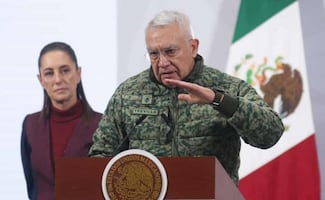Más Información

Identifican a célula de "Los Chapitos" como responsable de ataque armado a diputados de MC; legisladores son custodiados en hospital

Sheinbaum reacciona a orden de Trump sobre aranceles por envío de petróleo a Cuba; "podría desencadenar una crisis humanitaria"

Defensa anuncia cambios en mandos de alto nivel; Enrique Martínez López será el segundo del general Trevilla Trejo

Gobierno federal coordina búsqueda de 10 mineros desaparecidos en Sinaloa; no hay registro de amenazas previas, dice Harfuch

MC alista reforma a la FGR para "mejorar acceso a la justicia"; busca impulsar reducción de jornada laboral a 40 horas

Sheinbaum confía en presentar la reforma electoral la segunda semana de febrero; prevé integrar el tema de la IA
Over 70 countries have anti-gay laws which is one reason why Samantha Power, the U.S. ambassador to the United Nations, decided to take 17 U.N. ambassadors to the theater Tuesday night to see the Tony Award-winning play "Fun Home" whose main character is a lesbian with a closeted gay dad.
Power, a strong advocate for the rights of lesbians, gays, bisexuals and transsexuals, got a standing ovation at the end of the play, led by Tony nominee Beth Malone who thanked her and President Barack Obama for doing "so much for LGBT rights."
Based on the autobiographical graphic novel by Alison Bechdel, "Fun Home" centers on growing up in a family-owned funeral home in a small Pennsylvania town where the daughter realizes she's attracted to women and the father has secretly had affairs with men.
Power said she invited a diverse group of ambassadors to see the stories of real lives to bring home "the challenges that LGBT people face every day around the world."
According to a report last June by the U.N. human rights chief, at least 76 countries have laws used to criminalize and harass people on the basis of their sexual orientation and gender identity or expression, including laws criminalizing consensual same-sex relationships among adults.
The 17 ambassadors spanned the globe from Australia, Vietnam and Namibia to Norway, Mexico, Uruguay and Russia, which was strongly criticized for its anti-gay laws ahead of the 2014 Winter Olympics in Sochi. Several ambassadors said after the play that they arrived not knowing what it was about.
Power said the play dramatizes the LGBT issue "in a way that (U.N.) resolutions and statements never can."
"This is the way we are going to break through," she said. "It's about imagining oneself. It's about imagining one's child. It's about imagining one's father."
But Power stressed that "it takes time to change the DNA of the U.N. just as it's taken a lot of time to change the DNA of the United States."
Actress Cynthia Nixon from the TV series "Sex and the City" moderated an after-theater panel with the writers and cast, followed by comments from several ambassadors.
"Too often our work is about abstracts," Switzerland's Ambassador Jurg Lauber said. "Once in a while it's important to tell us it's about people."
Joao Vale de Almeida, the European Union's ambassador to the U.N. who is from Portugal, said his younger brother told him that he was gay on a long car ride - similar to one in the play - and they organized the way that he would tell their parents.
"It could have gone wrong but they went pretty well," he said. "It's a good story in my case. I know (for) other people, the stories were not so good."
Vale de Almeida said the performance was "great" and told the cast "it's crucial that you shared (the story) with everybody."
Noticias según tus intereses
[Publicidad]
[Publicidad]







